Edie Melson's Blog, page 358
December 3, 2015
5 Lessons I Learned from NaNoWriMo
by Lynn Blackburn @LynnHBlackburn
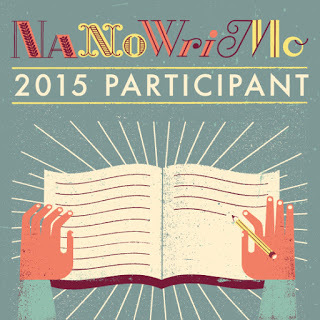 NaNoWriMo 2015 has come to an end.
NaNoWriMo 2015 has come to an end.
I did not win. I didn’t even come close.
I’m completely okay with that.
I knew that signing up for NaNoWriMo this year was a bit…well…crazy. (See last month’s post for the details). I did it anyway, and I have no regrets. There are words on the page that absolutely would not have been there if I hadn’t at least made the effort. In fact, there’s a good chance that my first draft would still be languishing in that dark and dreary place between “almost there” and “the end.” As December dawns, not only do I have a completed (finally!) first draft, but I’m almost 20K into a new story. If I wanted to base my “success” on word count alone, I would be pretty happy with my NaNo2015 experience.
But something happened in November that I didn’t expect.
I learned things. Not about the craft or about technique or even about how fast I can get 1K on the page.
I learned things about myself as a writer that I don’t think I would have learned any other way. If you didn’t “win” at NaNo, maybe my list will help you develop your own list of things you learned from NaNo2015.

1. I need to decompress after finishing a first draft. Trying to switch gears and throw myself into the new story did not work for me. At all. I lost precious time (from Day 9-13) floundering in a post-first draft funk. A highly unscientific (but I believe entirely accurate) survey of a handful of writing friends provided relief. Turns out this is normal. My creative pitcher had been emptied and it took a few days to refill it enough for me to get the words flowing again.
2. I need to experiment with having multiple stories in process. I’m not sure what this will look like yet. Maybe a novella or an entirely new series? I’ve always been a one story at a time girl, but November’s experience has me at least willing to see what happens when I have more than one storyline in process. I don’t think it will completely alleviate the post-first draft funk, but it might help.
3. I need to write when my world is crazy. I’ve written about this before, but this month reminded me again that this writing thing? It’s a big part of who I am. Not just in the way I define myself to others (“Hi, I’m Lynn. I’m a writer”) but even more importantly in the way I cope with the stresses of life. When I pull away from the story because of life’s demands, I make myself miserable. But carving out a couple of hours to write on the Wednesday before Thanksgiving turned out to be the smartest thing I could have done to prepare myself for the busyness of the days that followed. I learned it’s not selfishness to block out some writing time…it’s critical to my wellbeing.
4. I need challenging writing goals. When I’m not on a deadline from my publisher, I need to be setting more aggressive goals for myself. No more of this, “Well, I’d like to finish a book in six months” nonsense. I can do better than that. If I pulled off almost 30K in a November that was bonkers, there’s no reason I can’t do it again in January. (I’m not doing anything crazy in December…see my next point).
 5. I need to give myself permission to ignore the goals. I have a beautiful real life in the real world. If I’d pushed through a few more evenings, I probably could have added another 10K for the month, but I know the time and energy required to get to 50K would have taken more of me than I was willing to give. I have no regrets about the Thanksgiving walk around the neighborhood, the evening spent playing cards with my nieces, or the afternoon where my house overflowed with family, friends, food, and football. I could have said no to those things, sequestered myself in my room, and pounded out the words, and there will be times in the future when I will make that choice. But there shouldn’t be any guilt or drama over choosing to revel in the richness of the real world while saving the story world for another day. Maybe one where it’s cold, rainy, and the house is quiet.
5. I need to give myself permission to ignore the goals. I have a beautiful real life in the real world. If I’d pushed through a few more evenings, I probably could have added another 10K for the month, but I know the time and energy required to get to 50K would have taken more of me than I was willing to give. I have no regrets about the Thanksgiving walk around the neighborhood, the evening spent playing cards with my nieces, or the afternoon where my house overflowed with family, friends, food, and football. I could have said no to those things, sequestered myself in my room, and pounded out the words, and there will be times in the future when I will make that choice. But there shouldn’t be any guilt or drama over choosing to revel in the richness of the real world while saving the story world for another day. Maybe one where it’s cold, rainy, and the house is quiet.
Maybe a day like today.
So how about you? Did you win at NaNo? Burn out by Day 10? Learn something about yourself in the process? I’d love to hear about it!
Don’t forget to join the conversation.
TWEETABLE5 Lessons I Learned from NaNoWriMo (click to tweet)
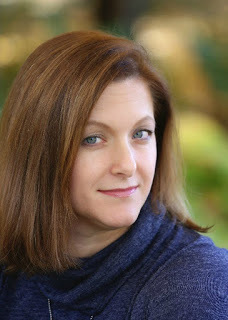 Lynn Huggins Blackburn believes in the power of stories, especially those that remind us that true love exists, a gift from the Truest Love.
Lynn Huggins Blackburn believes in the power of stories, especially those that remind us that true love exists, a gift from the Truest Love.
She’s passionate about CrossFit, coffee, and chocolate (don’t make her choose) and experimenting with recipes that feed both body and soul.
She lives in South Carolina with her true love, Brian, and their three children. You can follow her real life happily ever after at http://www.lynnhugginsblackburn.com.
 NaNoWriMo 2015 has come to an end.
NaNoWriMo 2015 has come to an end.I did not win. I didn’t even come close.
I’m completely okay with that.
I knew that signing up for NaNoWriMo this year was a bit…well…crazy. (See last month’s post for the details). I did it anyway, and I have no regrets. There are words on the page that absolutely would not have been there if I hadn’t at least made the effort. In fact, there’s a good chance that my first draft would still be languishing in that dark and dreary place between “almost there” and “the end.” As December dawns, not only do I have a completed (finally!) first draft, but I’m almost 20K into a new story. If I wanted to base my “success” on word count alone, I would be pretty happy with my NaNo2015 experience.
But something happened in November that I didn’t expect.
I learned things. Not about the craft or about technique or even about how fast I can get 1K on the page.
I learned things about myself as a writer that I don’t think I would have learned any other way. If you didn’t “win” at NaNo, maybe my list will help you develop your own list of things you learned from NaNo2015.

1. I need to decompress after finishing a first draft. Trying to switch gears and throw myself into the new story did not work for me. At all. I lost precious time (from Day 9-13) floundering in a post-first draft funk. A highly unscientific (but I believe entirely accurate) survey of a handful of writing friends provided relief. Turns out this is normal. My creative pitcher had been emptied and it took a few days to refill it enough for me to get the words flowing again.
2. I need to experiment with having multiple stories in process. I’m not sure what this will look like yet. Maybe a novella or an entirely new series? I’ve always been a one story at a time girl, but November’s experience has me at least willing to see what happens when I have more than one storyline in process. I don’t think it will completely alleviate the post-first draft funk, but it might help.
3. I need to write when my world is crazy. I’ve written about this before, but this month reminded me again that this writing thing? It’s a big part of who I am. Not just in the way I define myself to others (“Hi, I’m Lynn. I’m a writer”) but even more importantly in the way I cope with the stresses of life. When I pull away from the story because of life’s demands, I make myself miserable. But carving out a couple of hours to write on the Wednesday before Thanksgiving turned out to be the smartest thing I could have done to prepare myself for the busyness of the days that followed. I learned it’s not selfishness to block out some writing time…it’s critical to my wellbeing.
4. I need challenging writing goals. When I’m not on a deadline from my publisher, I need to be setting more aggressive goals for myself. No more of this, “Well, I’d like to finish a book in six months” nonsense. I can do better than that. If I pulled off almost 30K in a November that was bonkers, there’s no reason I can’t do it again in January. (I’m not doing anything crazy in December…see my next point).
 5. I need to give myself permission to ignore the goals. I have a beautiful real life in the real world. If I’d pushed through a few more evenings, I probably could have added another 10K for the month, but I know the time and energy required to get to 50K would have taken more of me than I was willing to give. I have no regrets about the Thanksgiving walk around the neighborhood, the evening spent playing cards with my nieces, or the afternoon where my house overflowed with family, friends, food, and football. I could have said no to those things, sequestered myself in my room, and pounded out the words, and there will be times in the future when I will make that choice. But there shouldn’t be any guilt or drama over choosing to revel in the richness of the real world while saving the story world for another day. Maybe one where it’s cold, rainy, and the house is quiet.
5. I need to give myself permission to ignore the goals. I have a beautiful real life in the real world. If I’d pushed through a few more evenings, I probably could have added another 10K for the month, but I know the time and energy required to get to 50K would have taken more of me than I was willing to give. I have no regrets about the Thanksgiving walk around the neighborhood, the evening spent playing cards with my nieces, or the afternoon where my house overflowed with family, friends, food, and football. I could have said no to those things, sequestered myself in my room, and pounded out the words, and there will be times in the future when I will make that choice. But there shouldn’t be any guilt or drama over choosing to revel in the richness of the real world while saving the story world for another day. Maybe one where it’s cold, rainy, and the house is quiet.Maybe a day like today.
So how about you? Did you win at NaNo? Burn out by Day 10? Learn something about yourself in the process? I’d love to hear about it!
Don’t forget to join the conversation.
TWEETABLE5 Lessons I Learned from NaNoWriMo (click to tweet)
 Lynn Huggins Blackburn believes in the power of stories, especially those that remind us that true love exists, a gift from the Truest Love.
Lynn Huggins Blackburn believes in the power of stories, especially those that remind us that true love exists, a gift from the Truest Love. She’s passionate about CrossFit, coffee, and chocolate (don’t make her choose) and experimenting with recipes that feed both body and soul.
She lives in South Carolina with her true love, Brian, and their three children. You can follow her real life happily ever after at http://www.lynnhugginsblackburn.com.
Published on December 03, 2015 01:00
December 2, 2015
10 Things That Steal Our Writing Joy
by Edie Melson @EdieMelson
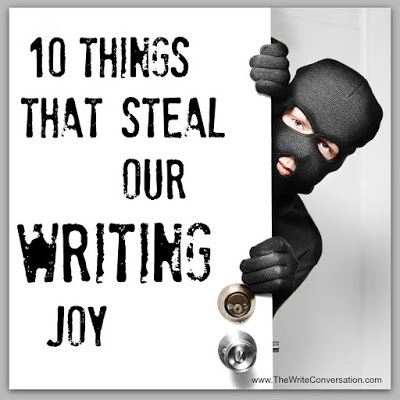 I’m a member of several writing groups, and I’m always amazed at the different reactions people have to similar situations. For instance, one writer might leave a critique session in tears, questioning whether or not the call to write was real. Another writer might have just as challenging a critique and leave energized because she now has the insight she needs to improve.
I’m a member of several writing groups, and I’m always amazed at the different reactions people have to similar situations. For instance, one writer might leave a critique session in tears, questioning whether or not the call to write was real. Another writer might have just as challenging a critique and leave energized because she now has the insight she needs to improve.
I’ve begun paying attention to the way the writers I respect handle this writing life. I’ve noticed that even though life gets hard at times, they never lose their writing joy. I’m trying to take deliberate steps to guard my joy of writing and not let things and/or people steal it from me. Today I’d like to share what I’ve discovered with you.
2. Being Unwilling to Let Go of Expectations. This one word can derail us for months, or even years, if we let it. It’s fine to make plans, but we can’t hang our hope—or our joy—on expectations.
 Not learning to roll with punches.3. Not Learning to Roll with the Punches. Hard times will come in this business. Landing a book deal and/or an agent is tough, and rarely happens quickly. When we have those two things, life can still blindside us. Contracts are cancelled, editors and agents move on without us. We’ve got to pick ourselves up and get back to writing, no matter what happens.
Not learning to roll with punches.3. Not Learning to Roll with the Punches. Hard times will come in this business. Landing a book deal and/or an agent is tough, and rarely happens quickly. When we have those two things, life can still blindside us. Contracts are cancelled, editors and agents move on without us. We’ve got to pick ourselves up and get back to writing, no matter what happens.
4. Always Looking Backward. If we dwell on the way things used to be in publishing, we’ll always be miserable. Not because things were always better, but because we think we remember them being better. Whether they were or weren’t really isn’t the point. What we need to do is learn what we can from the past and then keep our eyes firmly forward.
5. Chasing Trends.It’s tempting to tailor what we’re writing to what’s currently popular with publishers. But that’s a dead end road. There’s always something new, and it’s just not possible to pull out a crystal ball and write to what’s going to be hot when it hit the market. A wise writer gave me some advice I’ve never regretted following. “Write your passion. Don’t settle. Write what you love.” KristenHeitzmann
 Listening to the negative voices.6. Listening to the Negative Voices. There are two types of negative voices—the ones that live in your head and the ones belonging to those around us. I believe it’s the ones inside us that are the most dangerous. For one thing, they’re much more brazen. They say things that we’d never speak out loud. But if we let others also talk us out of following our dreams, they can be dangerous too. Take constructive criticism, but don’t let the negative words bring you down.
Listening to the negative voices.6. Listening to the Negative Voices. There are two types of negative voices—the ones that live in your head and the ones belonging to those around us. I believe it’s the ones inside us that are the most dangerous. For one thing, they’re much more brazen. They say things that we’d never speak out loud. But if we let others also talk us out of following our dreams, they can be dangerous too. Take constructive criticism, but don’t let the negative words bring you down.
7. Giving in to Fear.No matter how much we achieve as writers, we’re still fearful. We’re afraid of failure, of ridicule, even of success. But those writers who keep their joy are the ones who continue on in spite of the fear. They even get stronger because of the fear they overcome.
8. Perfectionism.We want to strive for our very best. But we need to understand that perfection is out of our grasp. Perfectionism can keep us from submitting our work for publication, and it can even keep us from writing. Aim high and always keep learning, but be willing accept the best you can do.
9. Not Writing. I truly believe that if our purpose in life is writing, and we don't make time to write, we'll be miserable. I know so many people who want to write, know they're called to write, and yet let everything else squeeze out the time to write. They are some of the most stressed out folks you'll ever see.
10. Forgetting the Reason You Started Writing in the First Place. We can get so caught up in the chase, that we forget why we entered the race. For me, God made me a writer. I process life through words. When I hit hard times and good times, one of my first actions is to record it, process it, and cope with it through writing. When I return to that, no matter what else is going on, everything falls into place.
These are the things I’ve found that steal our writing joy. What would you add?
Don’t forget to join the conversation!Blessings,Edie
TWEETABLESNOT Writing - plus 9 other things that steal our #writing joy - @EdieMelson (Click to Tweet)
Are you letting these 10 things steal your #writing joy? - @EdieMelson (Click to Tweet)
 I’m a member of several writing groups, and I’m always amazed at the different reactions people have to similar situations. For instance, one writer might leave a critique session in tears, questioning whether or not the call to write was real. Another writer might have just as challenging a critique and leave energized because she now has the insight she needs to improve.
I’m a member of several writing groups, and I’m always amazed at the different reactions people have to similar situations. For instance, one writer might leave a critique session in tears, questioning whether or not the call to write was real. Another writer might have just as challenging a critique and leave energized because she now has the insight she needs to improve. I’ve begun paying attention to the way the writers I respect handle this writing life. I’ve noticed that even though life gets hard at times, they never lose their writing joy. I’m trying to take deliberate steps to guard my joy of writing and not let things and/or people steal it from me. Today I’d like to share what I’ve discovered with you.
2. Being Unwilling to Let Go of Expectations. This one word can derail us for months, or even years, if we let it. It’s fine to make plans, but we can’t hang our hope—or our joy—on expectations.
 Not learning to roll with punches.3. Not Learning to Roll with the Punches. Hard times will come in this business. Landing a book deal and/or an agent is tough, and rarely happens quickly. When we have those two things, life can still blindside us. Contracts are cancelled, editors and agents move on without us. We’ve got to pick ourselves up and get back to writing, no matter what happens.
Not learning to roll with punches.3. Not Learning to Roll with the Punches. Hard times will come in this business. Landing a book deal and/or an agent is tough, and rarely happens quickly. When we have those two things, life can still blindside us. Contracts are cancelled, editors and agents move on without us. We’ve got to pick ourselves up and get back to writing, no matter what happens.4. Always Looking Backward. If we dwell on the way things used to be in publishing, we’ll always be miserable. Not because things were always better, but because we think we remember them being better. Whether they were or weren’t really isn’t the point. What we need to do is learn what we can from the past and then keep our eyes firmly forward.
5. Chasing Trends.It’s tempting to tailor what we’re writing to what’s currently popular with publishers. But that’s a dead end road. There’s always something new, and it’s just not possible to pull out a crystal ball and write to what’s going to be hot when it hit the market. A wise writer gave me some advice I’ve never regretted following. “Write your passion. Don’t settle. Write what you love.” KristenHeitzmann
 Listening to the negative voices.6. Listening to the Negative Voices. There are two types of negative voices—the ones that live in your head and the ones belonging to those around us. I believe it’s the ones inside us that are the most dangerous. For one thing, they’re much more brazen. They say things that we’d never speak out loud. But if we let others also talk us out of following our dreams, they can be dangerous too. Take constructive criticism, but don’t let the negative words bring you down.
Listening to the negative voices.6. Listening to the Negative Voices. There are two types of negative voices—the ones that live in your head and the ones belonging to those around us. I believe it’s the ones inside us that are the most dangerous. For one thing, they’re much more brazen. They say things that we’d never speak out loud. But if we let others also talk us out of following our dreams, they can be dangerous too. Take constructive criticism, but don’t let the negative words bring you down.7. Giving in to Fear.No matter how much we achieve as writers, we’re still fearful. We’re afraid of failure, of ridicule, even of success. But those writers who keep their joy are the ones who continue on in spite of the fear. They even get stronger because of the fear they overcome.
8. Perfectionism.We want to strive for our very best. But we need to understand that perfection is out of our grasp. Perfectionism can keep us from submitting our work for publication, and it can even keep us from writing. Aim high and always keep learning, but be willing accept the best you can do.
9. Not Writing. I truly believe that if our purpose in life is writing, and we don't make time to write, we'll be miserable. I know so many people who want to write, know they're called to write, and yet let everything else squeeze out the time to write. They are some of the most stressed out folks you'll ever see.
10. Forgetting the Reason You Started Writing in the First Place. We can get so caught up in the chase, that we forget why we entered the race. For me, God made me a writer. I process life through words. When I hit hard times and good times, one of my first actions is to record it, process it, and cope with it through writing. When I return to that, no matter what else is going on, everything falls into place.
These are the things I’ve found that steal our writing joy. What would you add?
Don’t forget to join the conversation!Blessings,Edie
TWEETABLESNOT Writing - plus 9 other things that steal our #writing joy - @EdieMelson (Click to Tweet)
Are you letting these 10 things steal your #writing joy? - @EdieMelson (Click to Tweet)
Published on December 02, 2015 01:00
December 1, 2015
Continuing the Empty Shelf Challenge
by Bethany Jett @BetJett
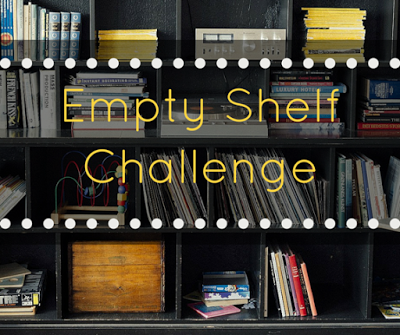 New York Times Bestselling author Jon Acuff threw the reading gauntletin 2013.
New York Times Bestselling author Jon Acuff threw the reading gauntletin 2013.
“Empty a shelf in your house somewhere. Every book you read from now until December 31, 2014 goes on the shelf. Waiting until January 1st to do something awesome is stupid and fake.”
The number of books on my to-read list is longer than my children’s Santa wish list, but sometimes the stress of life means books go untouched for far too long.
“If you don’t have time to read, you don’t have the time (or the tools) to write.” – Stephen King
The Empty Shelf Challenge gave me some weird sense of permission to read again. I’ve found that not only does my writing improve when I’m constantly reading, but it gives my mind a break from creating and lets me escape into beautiful worlds created by other talented writers.
Instead of emptying a shelf, I created a Pinterest board and started using my Goodreads account. I found that when the number of times I stared at the computer uninspired diminished. The words flew and my vocabulary increased. An appreciation for great writing intensified and I allowed myself to stop reading books that were poorly written without feeling guilty for not completing something I’d started.
“A writer’s brain is like a magician’s hat. If you’re going to get anything out of it, you have to put something in it first.” ―Louis L'Amour
 As a nonfiction writer, I found that reading great novels allowed me to draw creativity into my own works. In fact, one of my secret weapons while I was writing The Cinderella Rule was to pick up a copy of a bestseller and read until my heart and mind were so full that I couldn’t keep my fingers off the keyboard.
As a nonfiction writer, I found that reading great novels allowed me to draw creativity into my own works. In fact, one of my secret weapons while I was writing The Cinderella Rule was to pick up a copy of a bestseller and read until my heart and mind were so full that I couldn’t keep my fingers off the keyboard.
There are several places to find great books, but my newest favorite place is BookBub.com. When you create an account, you choose the categories and genres that appeal to you. They send you an email with that day’s free or heavily discounted books. Most are by bestsellers and have large 5-star ratings on Amazon.
Over the Thanksgiving holiday I stayed up until 2 AM reading one of Jeffery Archer’s books that was a free deal from BookBub. I found a new favorite author and Archer gained a new fan.
Today, I throw the gauntlet.
Join me as we read more books this year than ever before. We start now, because waiting to do something awesome is stupid.
TWEETABLES
#Reading is an escape into beautiful worlds created by talented authors - @BetJett (Click to Tweet)
Appreciation for great #writing intensifies when you choose to #read the best ofthe best (Click to Tweet)
Read more books this year than ever before: Join the Challenge. Itstarts the day you read this (Click to Tweet)
 Bethany Jett’s life changed when she left her first writers conference with an agent and a book deal. Not only was
The Cinderella Rule
a Selah Awards finalist, it opened doors to national speaking engagements, international radio interviews, multiple publishing opportunities, and teaching at writers conferences.
Bethany Jett’s life changed when she left her first writers conference with an agent and a book deal. Not only was
The Cinderella Rule
a Selah Awards finalist, it opened doors to national speaking engagements, international radio interviews, multiple publishing opportunities, and teaching at writers conferences.
Along with ghostwriting for her literary agency, Bethany founded Serious Writer Academy and created the My Moments quarterly planner and the Serious Writer’s Companion: the All-in-One Organizer for writers.
Connect with Bethany on Facebook, Twitter, Periscope, SeriousWriter.com and at BethanyJett.com. Click here to register for her upcoming free webinar “7 Secrets to Landing a Book Deal.”
 New York Times Bestselling author Jon Acuff threw the reading gauntletin 2013.
New York Times Bestselling author Jon Acuff threw the reading gauntletin 2013. “Empty a shelf in your house somewhere. Every book you read from now until December 31, 2014 goes on the shelf. Waiting until January 1st to do something awesome is stupid and fake.”
The number of books on my to-read list is longer than my children’s Santa wish list, but sometimes the stress of life means books go untouched for far too long.
“If you don’t have time to read, you don’t have the time (or the tools) to write.” – Stephen King
The Empty Shelf Challenge gave me some weird sense of permission to read again. I’ve found that not only does my writing improve when I’m constantly reading, but it gives my mind a break from creating and lets me escape into beautiful worlds created by other talented writers.
Instead of emptying a shelf, I created a Pinterest board and started using my Goodreads account. I found that when the number of times I stared at the computer uninspired diminished. The words flew and my vocabulary increased. An appreciation for great writing intensified and I allowed myself to stop reading books that were poorly written without feeling guilty for not completing something I’d started.
“A writer’s brain is like a magician’s hat. If you’re going to get anything out of it, you have to put something in it first.” ―Louis L'Amour
 As a nonfiction writer, I found that reading great novels allowed me to draw creativity into my own works. In fact, one of my secret weapons while I was writing The Cinderella Rule was to pick up a copy of a bestseller and read until my heart and mind were so full that I couldn’t keep my fingers off the keyboard.
As a nonfiction writer, I found that reading great novels allowed me to draw creativity into my own works. In fact, one of my secret weapons while I was writing The Cinderella Rule was to pick up a copy of a bestseller and read until my heart and mind were so full that I couldn’t keep my fingers off the keyboard.There are several places to find great books, but my newest favorite place is BookBub.com. When you create an account, you choose the categories and genres that appeal to you. They send you an email with that day’s free or heavily discounted books. Most are by bestsellers and have large 5-star ratings on Amazon.
Over the Thanksgiving holiday I stayed up until 2 AM reading one of Jeffery Archer’s books that was a free deal from BookBub. I found a new favorite author and Archer gained a new fan.
Today, I throw the gauntlet.
Join me as we read more books this year than ever before. We start now, because waiting to do something awesome is stupid.
TWEETABLES
#Reading is an escape into beautiful worlds created by talented authors - @BetJett (Click to Tweet)
Appreciation for great #writing intensifies when you choose to #read the best ofthe best (Click to Tweet)
Read more books this year than ever before: Join the Challenge. Itstarts the day you read this (Click to Tweet)
 Bethany Jett’s life changed when she left her first writers conference with an agent and a book deal. Not only was
The Cinderella Rule
a Selah Awards finalist, it opened doors to national speaking engagements, international radio interviews, multiple publishing opportunities, and teaching at writers conferences.
Bethany Jett’s life changed when she left her first writers conference with an agent and a book deal. Not only was
The Cinderella Rule
a Selah Awards finalist, it opened doors to national speaking engagements, international radio interviews, multiple publishing opportunities, and teaching at writers conferences.Along with ghostwriting for her literary agency, Bethany founded Serious Writer Academy and created the My Moments quarterly planner and the Serious Writer’s Companion: the All-in-One Organizer for writers.
Connect with Bethany on Facebook, Twitter, Periscope, SeriousWriter.com and at BethanyJett.com. Click here to register for her upcoming free webinar “7 Secrets to Landing a Book Deal.”
Published on December 01, 2015 01:00
November 30, 2015
Social Media Tips for the Holidays
I want to interrupt this blog post for a minute. I'm trying to continue to take this blog to next level and that means finding ways to get noticed. Today, on Write To Done (a prestigious blogging site), they're accepting nominations for your favorite writing blog. Even if you don't nominate this site, please take time to nominate your favorite blog. You must nominate a specific post in the comments section and mention why you think the blog is valuable. http://writetodone.com/top-10-blogs-for-writers-2016/
Social Media Tips for the Holidays
by Edie Melson @EdieMelson
 Let’s face it, the holidays are fun, but they’re also hectic.
Let’s face it, the holidays are fun, but they’re also hectic.
It's important to not abandon our social media profiles and blogs during the holidays, but we also need to work smarter, not harder.
By planning out some holiday social media updates in advance you save your sanity and keep the momentum going.
Here are some ideas for fun social media updates: Share your favorite holiday recipe and ask your friends/followers to share theirs. Ask your followers to give you tips on sanity savers during the holidays.Share a crazy holiday faux pas and ask others to share theirs.Share some of your favorite holiday reads.Ask for decorating ideas.Share a holiday tradition and ask for others to chime in.Ask about favorite holiday movies.Share your favorite Christmas carol and ask your friends to share theirs.
Share your favorite holiday recipe and ask your friends/followers to share theirs. Ask your followers to give you tips on sanity savers during the holidays.Share a crazy holiday faux pas and ask others to share theirs.Share some of your favorite holiday reads.Ask for decorating ideas.Share a holiday tradition and ask for others to chime in.Ask about favorite holiday movies.Share your favorite Christmas carol and ask your friends to share theirs.
I think you get the idea.
Tips to Organize Updates & Get Them Ready to GoIt's as important to have the updates easy to access as it is to have them ready in advance. For me, I like to use a combination of ways to keep them organized. Set up a folder on your desktop and label it holiday updates.Inside the folder, I have several subfolders: A Word document of text updates, complete with links if I want to send them to a specific blog or site.A Word document with quotes that I might want to use on a meme.A folder of images (make sure they're legal to use. If you're not sure here's a link to a blog post about finding legal images.) I think would make good memes.A folder of finished memes ready to share.A calendar/schedule for sharing the memes. This can be in a Word document, spreadsheet or another type of file.
 Even though it's only the last day of November, it's almost past time to get organized for the holidays. By already having these updates ready, you can relax and not have to spend valuable time creating them.
Even though it's only the last day of November, it's almost past time to get organized for the holidays. By already having these updates ready, you can relax and not have to spend valuable time creating them.
You can also plan some blog posts in advance. The holidays are a good time to plan a giveaway. You can also plan a holiday cookie recipe exchange and a holiday potluck recipe exchange for your blog. The easiest way to do this is through a Meme. I use Linkyto do all my memes. Here's a blog post to Get Started with Memes.
Now it’s your turn, share some holiday conversation starters, and blog post ideas.
Don’t forget to join the conversation!Blessings,Edie
TWEETABLESWork smarter, not harder with these #socialmedia tips for the holidays - @EdieMelson (Click to Tweet)
Timesaving tips from @EdieMelson to get your #blog & #socialmedia holidayready. (Click to Tweet)
Social Media Tips for the Holidays
by Edie Melson @EdieMelson
 Let’s face it, the holidays are fun, but they’re also hectic.
Let’s face it, the holidays are fun, but they’re also hectic.It's important to not abandon our social media profiles and blogs during the holidays, but we also need to work smarter, not harder.
By planning out some holiday social media updates in advance you save your sanity and keep the momentum going.
Here are some ideas for fun social media updates:
 Share your favorite holiday recipe and ask your friends/followers to share theirs. Ask your followers to give you tips on sanity savers during the holidays.Share a crazy holiday faux pas and ask others to share theirs.Share some of your favorite holiday reads.Ask for decorating ideas.Share a holiday tradition and ask for others to chime in.Ask about favorite holiday movies.Share your favorite Christmas carol and ask your friends to share theirs.
Share your favorite holiday recipe and ask your friends/followers to share theirs. Ask your followers to give you tips on sanity savers during the holidays.Share a crazy holiday faux pas and ask others to share theirs.Share some of your favorite holiday reads.Ask for decorating ideas.Share a holiday tradition and ask for others to chime in.Ask about favorite holiday movies.Share your favorite Christmas carol and ask your friends to share theirs. I think you get the idea.
Tips to Organize Updates & Get Them Ready to GoIt's as important to have the updates easy to access as it is to have them ready in advance. For me, I like to use a combination of ways to keep them organized. Set up a folder on your desktop and label it holiday updates.Inside the folder, I have several subfolders: A Word document of text updates, complete with links if I want to send them to a specific blog or site.A Word document with quotes that I might want to use on a meme.A folder of images (make sure they're legal to use. If you're not sure here's a link to a blog post about finding legal images.) I think would make good memes.A folder of finished memes ready to share.A calendar/schedule for sharing the memes. This can be in a Word document, spreadsheet or another type of file.
 Even though it's only the last day of November, it's almost past time to get organized for the holidays. By already having these updates ready, you can relax and not have to spend valuable time creating them.
Even though it's only the last day of November, it's almost past time to get organized for the holidays. By already having these updates ready, you can relax and not have to spend valuable time creating them.You can also plan some blog posts in advance. The holidays are a good time to plan a giveaway. You can also plan a holiday cookie recipe exchange and a holiday potluck recipe exchange for your blog. The easiest way to do this is through a Meme. I use Linkyto do all my memes. Here's a blog post to Get Started with Memes.
Now it’s your turn, share some holiday conversation starters, and blog post ideas.
Don’t forget to join the conversation!Blessings,Edie
TWEETABLESWork smarter, not harder with these #socialmedia tips for the holidays - @EdieMelson (Click to Tweet)
Timesaving tips from @EdieMelson to get your #blog & #socialmedia holidayready. (Click to Tweet)
Published on November 30, 2015 01:00
November 29, 2015
Living Life Unfiltered
by Edie Melson @EdieMelson
 I’m an amateur photographer and love all the creative things I can do online with the images I share. When I first began experimenting with my photos, I got a little wild with all the different effects. By adding different filters, I could completely change the look of a picture.
I’m an amateur photographer and love all the creative things I can do online with the images I share. When I first began experimenting with my photos, I got a little wild with all the different effects. By adding different filters, I could completely change the look of a picture.
Where once an image was sunny and bright, I could bring it down to look dark and gloomy. I could also do the opposite. I added frames, embedded graphics, even melded two images into one. The options were endless.
 But once the new wore off, I found that my favorite images were the ones that looked most like real life—with little or no effects applied. The ones that captured that moment, without embellishment, brought me the most joy. Those unadorned pictures were also the ones that garnered the most attention online. They seemed to bring out the best conversations.
But once the new wore off, I found that my favorite images were the ones that looked most like real life—with little or no effects applied. The ones that captured that moment, without embellishment, brought me the most joy. Those unadorned pictures were also the ones that garnered the most attention online. They seemed to bring out the best conversations.
And not too long ago, God whispered a parallel truth to me about my own life. So often, when I share things about me, my tendency is to apply a filter. It doesn’t matter if it’s something positive or negative, I can’t seem to just lay it out there. I play around with what I share, how I share it, and even the spin I put on it when I share it.
I try to frame it and embellish it with explanations and logic. I apologize for the good things, downplay the negative things, and generally try to neaten life up.
But the times when I’m most honest about what I’m experiencing, are the times when I connect deepest with those around me. Those moments of transparency and realism are when God can come in and touch others. It’s when I’m most vulnerable, that I’m most valuable to the kingdom.
Therefore, having put away falsehood, let each one of you speak the truth with his neighbor, for we are members one of another. Ephesians 4:15 (ESV)
TWEETABLE
"It's when I'm most vulnerable, that I'm most valuable in God's kingdom." @EdieMelson (Click to Tweet)
 I’m an amateur photographer and love all the creative things I can do online with the images I share. When I first began experimenting with my photos, I got a little wild with all the different effects. By adding different filters, I could completely change the look of a picture.
I’m an amateur photographer and love all the creative things I can do online with the images I share. When I first began experimenting with my photos, I got a little wild with all the different effects. By adding different filters, I could completely change the look of a picture. Where once an image was sunny and bright, I could bring it down to look dark and gloomy. I could also do the opposite. I added frames, embedded graphics, even melded two images into one. The options were endless.
 But once the new wore off, I found that my favorite images were the ones that looked most like real life—with little or no effects applied. The ones that captured that moment, without embellishment, brought me the most joy. Those unadorned pictures were also the ones that garnered the most attention online. They seemed to bring out the best conversations.
But once the new wore off, I found that my favorite images were the ones that looked most like real life—with little or no effects applied. The ones that captured that moment, without embellishment, brought me the most joy. Those unadorned pictures were also the ones that garnered the most attention online. They seemed to bring out the best conversations.And not too long ago, God whispered a parallel truth to me about my own life. So often, when I share things about me, my tendency is to apply a filter. It doesn’t matter if it’s something positive or negative, I can’t seem to just lay it out there. I play around with what I share, how I share it, and even the spin I put on it when I share it.
I try to frame it and embellish it with explanations and logic. I apologize for the good things, downplay the negative things, and generally try to neaten life up.
But the times when I’m most honest about what I’m experiencing, are the times when I connect deepest with those around me. Those moments of transparency and realism are when God can come in and touch others. It’s when I’m most vulnerable, that I’m most valuable to the kingdom.
Therefore, having put away falsehood, let each one of you speak the truth with his neighbor, for we are members one of another. Ephesians 4:15 (ESV)
TWEETABLE
"It's when I'm most vulnerable, that I'm most valuable in God's kingdom." @EdieMelson (Click to Tweet)
Published on November 29, 2015 01:00
November 28, 2015
And the Winners of the 3 Amazon Gift Cards Are...

Thank you all for sharing the joy of my special day as I celebrated post number 1500! I'm excited to announce the three winners:
Jann Martin
Lori Hatcher
Karen 'Girl' Friday
Please email me at ediegmelson (at) gmail (dot) com and I'll send you your gift!
Thanks & Blessings,
Edie
Published on November 28, 2015 01:00
November 27, 2015
Why Should I Attend a Writing Conference
by Lori Hatcher @LoriHatcher2
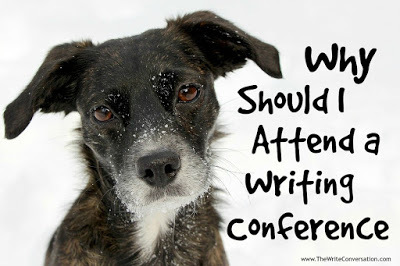 “Tell me why I should go to a writers conference,” my friend Melissa said. “I’m swamped at work, discouraged about my writing, and behind on my W.I.P. (Work In Progress). I’m not sure I can afford the time away.”
“Tell me why I should go to a writers conference,” my friend Melissa said. “I’m swamped at work, discouraged about my writing, and behind on my W.I.P. (Work In Progress). I’m not sure I can afford the time away.”
Melissa and I have commiserated on the ups and downs of the writing life for years. She’s a seasoned writer who could probably teach most of the conference workshops. She doesn’t need another class on self-editing or how to write dialogue. Yet I still encouraged her to attend.Here’s why:
1. A writer’s life is hard. We get weary. We lose sight of the big picture. Sometimes we’re not even sure what the big picture is. A strategically timed Christian writers conference reminds us that we are not the genesis of our work—God is. It is “God, who is working in you, enabling you, both to will and to act for His good purpose” (Philippians 2:13).
I get discouraged when I think it’s all up to me—that it’s my ideas, my creativity, and my energy that propels my writing life forward. The wise mentors at a good Christian writers’ conference remind me this is backward. My responsibility is to pray hard, work hard, and trust God with the results.
 2. If left to myself, I would work all day every day, always pouring out, and never taking in. And I would be an empty vessel with nothing left to give. Writers’ conferences fill me up again. Instead of wasting time, I’m actually investing time in my future writing. I come away inspired, encouraged, and filled with enthusiasm. I think I’m losing time, when in reality, I’m gaining time, because the energy and inspiration I receive empowers and propels me forward.
2. If left to myself, I would work all day every day, always pouring out, and never taking in. And I would be an empty vessel with nothing left to give. Writers’ conferences fill me up again. Instead of wasting time, I’m actually investing time in my future writing. I come away inspired, encouraged, and filled with enthusiasm. I think I’m losing time, when in reality, I’m gaining time, because the energy and inspiration I receive empowers and propels me forward.
3. Writers’ conferences remind me of why I love being a writer. From the starry-eyed newbies who just wrote their first blog post to the seasoned authors working on their tenth book, my fellow writers share the crazy desire to change the world through the written world and help me believe it can be done.
Who else cares whether I use a serial comma? Who else spends 30 minutes combing through a thesaurus to find THE word? Who else goes without sleep, food, or showers to birth a book baby? Only crazy writers, God-called writers, God-inspired writers who get it and really understand that “in the beginning was the Word, and the Word was with God and the Word WAS God,” and God is still using words to change the world.
 4. Writers conferences give me space to breathe, and dream, and hope. The grind of the daily writing life squeezes this out. The beautiful setting of a writers conference lifts my eyes beyond the page, my desk, and my life. It reminds me that the world is big and beautiful, God is even bigger and more beautiful, and he created me to be part of his big, beautiful work in the world.
4. Writers conferences give me space to breathe, and dream, and hope. The grind of the daily writing life squeezes this out. The beautiful setting of a writers conference lifts my eyes beyond the page, my desk, and my life. It reminds me that the world is big and beautiful, God is even bigger and more beautiful, and he created me to be part of his big, beautiful work in the world.
5. Writers’ conferences provide an opportunity to give back. Eddie Jones, one of the founders of Writers Advance Boot Camp, was the first person who said to me, “This could be a book.” Two years later, it was. Also at that conference I learned a simple method for writing a Christian devotion. Within a year, magazines were paying me for my writing. Fellow writers I’ve met at conferences have become my mentors, colleagues, and friends. I wouldn’t be where I am today in my writing life if I hadn’t attended at least one writers conference every year since 2011.
Whether I’m volunteering at a registration table, leading a workshop on how to use Pinterest to grow your blog, or praying for the conference leaders and directors, attending writers conferences gives me a chance to pay it forward. It allows me to invest in others the way others have invested in me—and repay a debt of gratitude.
6. Writers’ conferences introduce me to friends—friends who are interested in what God has called me to do. Friends who will talk me off the ledge when I’m ready to end it all. Friends who will snatch my manuscript out of my hands the second before I toss it into the flames. And friends who will help me feed it into the flames when necessary while simultaneously helping me plan the next, better, stronger project.
I don’t have the time or the money to attend a Christian writers’ conference every year, but I go anyway. The way I see it, I can’t afford not to.
~Lori
TWEETABLEWhy should I attend a #writing conference - reasons from @LoriHatcher2 on @EdieMelson (Click to Tweet)
 Lori Hatcher is an author, blogger, and women’s ministry speaker. She’s the editor of South Carolina’s Reach Out, Columbia magazine, and has authored two devotional books, Hungry for God … Starving for Time, Five-Minute Devotions for Busy Women and Joy in the Journey – Encouragement for Homeschooling Moms. An award-winning Toastmasters International speaker and Christian Communicators grad, she uses her speaking and writing ministry to help busy women connect with God in the craziness of life. You’ll find her pondering the marvelous and the mundane on her blog, Hungry for God. . . Starving for Time (www.LoriHatcher.com).
Lori Hatcher is an author, blogger, and women’s ministry speaker. She’s the editor of South Carolina’s Reach Out, Columbia magazine, and has authored two devotional books, Hungry for God … Starving for Time, Five-Minute Devotions for Busy Women and Joy in the Journey – Encouragement for Homeschooling Moms. An award-winning Toastmasters International speaker and Christian Communicators grad, she uses her speaking and writing ministry to help busy women connect with God in the craziness of life. You’ll find her pondering the marvelous and the mundane on her blog, Hungry for God. . . Starving for Time (www.LoriHatcher.com).
 “Tell me why I should go to a writers conference,” my friend Melissa said. “I’m swamped at work, discouraged about my writing, and behind on my W.I.P. (Work In Progress). I’m not sure I can afford the time away.”
“Tell me why I should go to a writers conference,” my friend Melissa said. “I’m swamped at work, discouraged about my writing, and behind on my W.I.P. (Work In Progress). I’m not sure I can afford the time away.”Melissa and I have commiserated on the ups and downs of the writing life for years. She’s a seasoned writer who could probably teach most of the conference workshops. She doesn’t need another class on self-editing or how to write dialogue. Yet I still encouraged her to attend.Here’s why:
1. A writer’s life is hard. We get weary. We lose sight of the big picture. Sometimes we’re not even sure what the big picture is. A strategically timed Christian writers conference reminds us that we are not the genesis of our work—God is. It is “God, who is working in you, enabling you, both to will and to act for His good purpose” (Philippians 2:13).
I get discouraged when I think it’s all up to me—that it’s my ideas, my creativity, and my energy that propels my writing life forward. The wise mentors at a good Christian writers’ conference remind me this is backward. My responsibility is to pray hard, work hard, and trust God with the results.
 2. If left to myself, I would work all day every day, always pouring out, and never taking in. And I would be an empty vessel with nothing left to give. Writers’ conferences fill me up again. Instead of wasting time, I’m actually investing time in my future writing. I come away inspired, encouraged, and filled with enthusiasm. I think I’m losing time, when in reality, I’m gaining time, because the energy and inspiration I receive empowers and propels me forward.
2. If left to myself, I would work all day every day, always pouring out, and never taking in. And I would be an empty vessel with nothing left to give. Writers’ conferences fill me up again. Instead of wasting time, I’m actually investing time in my future writing. I come away inspired, encouraged, and filled with enthusiasm. I think I’m losing time, when in reality, I’m gaining time, because the energy and inspiration I receive empowers and propels me forward.3. Writers’ conferences remind me of why I love being a writer. From the starry-eyed newbies who just wrote their first blog post to the seasoned authors working on their tenth book, my fellow writers share the crazy desire to change the world through the written world and help me believe it can be done.
Who else cares whether I use a serial comma? Who else spends 30 minutes combing through a thesaurus to find THE word? Who else goes without sleep, food, or showers to birth a book baby? Only crazy writers, God-called writers, God-inspired writers who get it and really understand that “in the beginning was the Word, and the Word was with God and the Word WAS God,” and God is still using words to change the world.
 4. Writers conferences give me space to breathe, and dream, and hope. The grind of the daily writing life squeezes this out. The beautiful setting of a writers conference lifts my eyes beyond the page, my desk, and my life. It reminds me that the world is big and beautiful, God is even bigger and more beautiful, and he created me to be part of his big, beautiful work in the world.
4. Writers conferences give me space to breathe, and dream, and hope. The grind of the daily writing life squeezes this out. The beautiful setting of a writers conference lifts my eyes beyond the page, my desk, and my life. It reminds me that the world is big and beautiful, God is even bigger and more beautiful, and he created me to be part of his big, beautiful work in the world.5. Writers’ conferences provide an opportunity to give back. Eddie Jones, one of the founders of Writers Advance Boot Camp, was the first person who said to me, “This could be a book.” Two years later, it was. Also at that conference I learned a simple method for writing a Christian devotion. Within a year, magazines were paying me for my writing. Fellow writers I’ve met at conferences have become my mentors, colleagues, and friends. I wouldn’t be where I am today in my writing life if I hadn’t attended at least one writers conference every year since 2011.
Whether I’m volunteering at a registration table, leading a workshop on how to use Pinterest to grow your blog, or praying for the conference leaders and directors, attending writers conferences gives me a chance to pay it forward. It allows me to invest in others the way others have invested in me—and repay a debt of gratitude.
6. Writers’ conferences introduce me to friends—friends who are interested in what God has called me to do. Friends who will talk me off the ledge when I’m ready to end it all. Friends who will snatch my manuscript out of my hands the second before I toss it into the flames. And friends who will help me feed it into the flames when necessary while simultaneously helping me plan the next, better, stronger project.
I don’t have the time or the money to attend a Christian writers’ conference every year, but I go anyway. The way I see it, I can’t afford not to.
~Lori
TWEETABLEWhy should I attend a #writing conference - reasons from @LoriHatcher2 on @EdieMelson (Click to Tweet)
 Lori Hatcher is an author, blogger, and women’s ministry speaker. She’s the editor of South Carolina’s Reach Out, Columbia magazine, and has authored two devotional books, Hungry for God … Starving for Time, Five-Minute Devotions for Busy Women and Joy in the Journey – Encouragement for Homeschooling Moms. An award-winning Toastmasters International speaker and Christian Communicators grad, she uses her speaking and writing ministry to help busy women connect with God in the craziness of life. You’ll find her pondering the marvelous and the mundane on her blog, Hungry for God. . . Starving for Time (www.LoriHatcher.com).
Lori Hatcher is an author, blogger, and women’s ministry speaker. She’s the editor of South Carolina’s Reach Out, Columbia magazine, and has authored two devotional books, Hungry for God … Starving for Time, Five-Minute Devotions for Busy Women and Joy in the Journey – Encouragement for Homeschooling Moms. An award-winning Toastmasters International speaker and Christian Communicators grad, she uses her speaking and writing ministry to help busy women connect with God in the craziness of life. You’ll find her pondering the marvelous and the mundane on her blog, Hungry for God. . . Starving for Time (www.LoriHatcher.com).
Published on November 27, 2015 01:00
November 26, 2015
Plot Problems Solved in 3 Questions
Before you get into the post from Henry McLaughlin today, all of us at The Write Conversation want to wish you a Happy & Blessed Thanksgiving!

Plot Problems solved in 3 Questionsby Henry McLaughlin @RiverBendSagas
Here is a tool that may prove helpful. Best-selling author Steven Jamespresented this material at an intensive novel writing retreat I attended.
Whether you’re an outliner or an organic author, these simple, yet intriguing questions, will get your creative juices flowing.
The questions open doors into areas of our story we may not have explored before and will lead us to more compelling stories.
What would this character naturally do in this situation?
Believability is the first priority. If our character does something he would not naturally do, it will the strain the reader’s investment in him and in our story.
For example, say our character is an inspector with the National Transportation Safety Board. What’s the first thing he would do at the scene of a plane crash? Would he ask where is the nearest Starbucks? Or would he ask if the black box has been found or if there are any survivors?
Or, he’s an ER doctor and the paramedics have brought in a victim of a gunshot wound. Would he ask when the next available tee time is? Or, would he assess the patient’s need for immediate surgery?
If the reader notices our character is acting unbelievably, than another character must also notice it and comment on it. Otherwise, our story loses credibility.
How can I make things worse?
Escalate the tension by throwing more obstacles at our character. Increase the tension to keep the reader interested. But remember—it has to be believable.
Say my story involves terrorists taking over a nuclear power plant and holding the staff hostage. How can I make things worse? Here are some examples:They strap bombs to the core.There is a group of school kids there on a field trip.They start killing the hostages.The daughter of the chief government negotiator works at the plant.She’s aiding the terrorists.
The key is to avoid coincidence because this will destroy believability. Everything must build on something that happened before. How can I end this in a way that’s unexpected and inevitable?
Readers don’t want endings to come out of nowhere. The ending needs to be natural and inherent to the story. We want the reader to be surprised and satisfied.
In my novel, Journey to Riverbend, I established throughout the story that my hero believed he killed his father and that he would never kill again. At the end of the story, I put him in the position where, to save someone, he has to kill the villain. The ending was inevitable yet surprising and satisfying to the readers. It was also be believable because of the foreshadowing I layered in.
Steven James writes, “The first question will help focus your believability. The second will keep it escalating toward an unforgettable climax. The third will help build your story scene by twisting, turning scene.”
What plot problems do you typically encounter? How would these three questions help resolve them?
TWEETABLESDon't get bogged down in plot problems, just ask these 3 questions - @RiverBendSagas (Click to Tweet)
Author Henry McLaughlin offers help to solve plot problems in 3 questions (Click to Tweet)
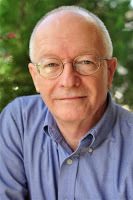 Henry’s debut novel, Journey to Riverbend, won the 2009 Operation First Novel contest.
Henry’s debut novel, Journey to Riverbend, won the 2009 Operation First Novel contest.
He serves as Associate Director of North Texas Christian Writers.
Henry edits novels, leads critique groups, and teaches at conferences and workshops. He enjoys mentoring and coaching individual writers.
Connect with Henry on his blog, Twitter and Facebook.

Plot Problems solved in 3 Questionsby Henry McLaughlin @RiverBendSagas
Here is a tool that may prove helpful. Best-selling author Steven Jamespresented this material at an intensive novel writing retreat I attended.
Whether you’re an outliner or an organic author, these simple, yet intriguing questions, will get your creative juices flowing.
The questions open doors into areas of our story we may not have explored before and will lead us to more compelling stories.
What would this character naturally do in this situation?
Believability is the first priority. If our character does something he would not naturally do, it will the strain the reader’s investment in him and in our story.
For example, say our character is an inspector with the National Transportation Safety Board. What’s the first thing he would do at the scene of a plane crash? Would he ask where is the nearest Starbucks? Or would he ask if the black box has been found or if there are any survivors?
Or, he’s an ER doctor and the paramedics have brought in a victim of a gunshot wound. Would he ask when the next available tee time is? Or, would he assess the patient’s need for immediate surgery?
If the reader notices our character is acting unbelievably, than another character must also notice it and comment on it. Otherwise, our story loses credibility.
How can I make things worse?
Escalate the tension by throwing more obstacles at our character. Increase the tension to keep the reader interested. But remember—it has to be believable.
Say my story involves terrorists taking over a nuclear power plant and holding the staff hostage. How can I make things worse? Here are some examples:They strap bombs to the core.There is a group of school kids there on a field trip.They start killing the hostages.The daughter of the chief government negotiator works at the plant.She’s aiding the terrorists.
The key is to avoid coincidence because this will destroy believability. Everything must build on something that happened before. How can I end this in a way that’s unexpected and inevitable?
Readers don’t want endings to come out of nowhere. The ending needs to be natural and inherent to the story. We want the reader to be surprised and satisfied.
In my novel, Journey to Riverbend, I established throughout the story that my hero believed he killed his father and that he would never kill again. At the end of the story, I put him in the position where, to save someone, he has to kill the villain. The ending was inevitable yet surprising and satisfying to the readers. It was also be believable because of the foreshadowing I layered in.
Steven James writes, “The first question will help focus your believability. The second will keep it escalating toward an unforgettable climax. The third will help build your story scene by twisting, turning scene.”
What plot problems do you typically encounter? How would these three questions help resolve them?
TWEETABLESDon't get bogged down in plot problems, just ask these 3 questions - @RiverBendSagas (Click to Tweet)
Author Henry McLaughlin offers help to solve plot problems in 3 questions (Click to Tweet)
 Henry’s debut novel, Journey to Riverbend, won the 2009 Operation First Novel contest.
Henry’s debut novel, Journey to Riverbend, won the 2009 Operation First Novel contest. He serves as Associate Director of North Texas Christian Writers.
Henry edits novels, leads critique groups, and teaches at conferences and workshops. He enjoys mentoring and coaching individual writers.
Connect with Henry on his blog, Twitter and Facebook.
Published on November 26, 2015 01:00
November 25, 2015
It’s Time to Celebrate . . . YOU!
by Edie Melson @EdieMelson
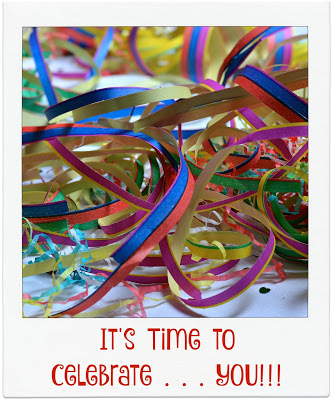 Today is a milestone in the life of The Write Conversation, and in my own blogging life. This post is number 1500.
Today is a milestone in the life of The Write Conversation, and in my own blogging life. This post is number 1500.
I read that and I just need to take a minute and let that sink in.
When I shared this information with my husband, his comment was, “Wow that’s over 4 years of posting. I thought you’d been at this longer than that.”
Well he’s right, and he’s wrong.
If I’d been posting 7 days a week from the very beginning of this blog, it would only be 4 years a few months. But I didn’t start out sharing a post a day. I started slow—giving myself a chance to succeed—posting only once a week.
The first post on this site went live on December 11, 2009.
Those early posts were rough. And many of you may think I’ve long since taken them down. But the truth is, as bad as they were, I’m proud of those first posts. To me, they represent my public claim as a writer.
 I knew I had a long way to go.
I knew I had a long way to go.
But I also knew that I’d never get there if I didn’t get started. If I’d waited until I was polished and perfect . . . well . . . I’d still be waiting.
Funny thing is, that’s what the first post is all about. I wrote about Mastering Your Dream. As much of a beginner as I was, I still knew that getting where I want to go takes work.
Enough about me.
The title of this post says what I want to focus on—celebrating YOU.
Each of you is taking time right now, investing in your dream. You’re making the effort to learn and grow as a writer. You’re reaching out and encouraging one another as we come together to follow the path set before us.
I wish I could give each of you a gift. It would only be fitting because this blog would be nothing without you.
What I’m doing instead is offering the chance to win one of 3 $15 Amazon gift cards. You don’t have to do anything to enter the drawing—no tweeting or sharing or liking required. All you have to do is leave a short comment. Then check back on Thanksgiving to see if you won.
Don’t forget to join the conversation!Blessings,Edie
Oh, in case you’re curious, here are some links to the earliest posts, along with the stats (and you should notice I didn't even know enough to use images to illustrate my posts). They're untouched. I've left them just as they were when I first put them up.
Monday, December 11, 2009Page views before today: 40http://thewriteconversation.blogspot.com/2009/12/mastering-your-dream.html
Monday, December 21, 2009 Page views before today: 21http://thewriteconversation.blogspot.com/2009/12/writers-path.html
Monday, January 25, 2010 Page views before today: 12
http://thewriteconversation.blogspot.com/2010/01/writing-for-internet-discussing-and.html
 Today is a milestone in the life of The Write Conversation, and in my own blogging life. This post is number 1500.
Today is a milestone in the life of The Write Conversation, and in my own blogging life. This post is number 1500.I read that and I just need to take a minute and let that sink in.
When I shared this information with my husband, his comment was, “Wow that’s over 4 years of posting. I thought you’d been at this longer than that.”
Well he’s right, and he’s wrong.
If I’d been posting 7 days a week from the very beginning of this blog, it would only be 4 years a few months. But I didn’t start out sharing a post a day. I started slow—giving myself a chance to succeed—posting only once a week.
The first post on this site went live on December 11, 2009.
Those early posts were rough. And many of you may think I’ve long since taken them down. But the truth is, as bad as they were, I’m proud of those first posts. To me, they represent my public claim as a writer.
 I knew I had a long way to go.
I knew I had a long way to go. But I also knew that I’d never get there if I didn’t get started. If I’d waited until I was polished and perfect . . . well . . . I’d still be waiting.
Funny thing is, that’s what the first post is all about. I wrote about Mastering Your Dream. As much of a beginner as I was, I still knew that getting where I want to go takes work.
Enough about me.
The title of this post says what I want to focus on—celebrating YOU.
Each of you is taking time right now, investing in your dream. You’re making the effort to learn and grow as a writer. You’re reaching out and encouraging one another as we come together to follow the path set before us.
I wish I could give each of you a gift. It would only be fitting because this blog would be nothing without you.
What I’m doing instead is offering the chance to win one of 3 $15 Amazon gift cards. You don’t have to do anything to enter the drawing—no tweeting or sharing or liking required. All you have to do is leave a short comment. Then check back on Thanksgiving to see if you won.
Don’t forget to join the conversation!Blessings,Edie
Oh, in case you’re curious, here are some links to the earliest posts, along with the stats (and you should notice I didn't even know enough to use images to illustrate my posts). They're untouched. I've left them just as they were when I first put them up.
Monday, December 11, 2009Page views before today: 40http://thewriteconversation.blogspot.com/2009/12/mastering-your-dream.html
Monday, December 21, 2009 Page views before today: 21http://thewriteconversation.blogspot.com/2009/12/writers-path.html
Monday, January 25, 2010 Page views before today: 12
http://thewriteconversation.blogspot.com/2010/01/writing-for-internet-discussing-and.html
Published on November 25, 2015 01:00
November 24, 2015
Writing Like You Know What You’re Talking About
 Eva Marie EversonEdie here. Today I'm super excited to welcome our newest member of The Write Conversation blogging contributors. In addition to being a good friend, she's been my mentor and one of my biggest encouragers. Her contribution to the Christian publishing industry stretches from east to west. I know you'll be as elated as I am to welcome author, editor and writing mentor Eva Marie Everson!
Eva Marie EversonEdie here. Today I'm super excited to welcome our newest member of The Write Conversation blogging contributors. In addition to being a good friend, she's been my mentor and one of my biggest encouragers. Her contribution to the Christian publishing industry stretches from east to west. I know you'll be as elated as I am to welcome author, editor and writing mentor Eva Marie Everson!Writing Like You Know What You're Talking Aboutby Eva Marie Everson @EvaMarieEverson
Have you ever set a scene, a section of a book, or an entire novel somewhere you’ve never been? I have. Plenty of times.
In those days, AOL had the ability to search for other members by interest, where they lived, etc. So, I got busy. I sent out dozens of requests to those who live in NYC and—after explaining what I was doing and why—I asked, “Did you by chance live in NYC during the 1970s? Did you live in Hell’s Kitchen? If so, what can you tell me?”
 Within a few days, I’d interviewed approximately seven people who really knew the area, the era, and everything in between. I asked detailed questions, such as “what could you see? What could you hear? What could you smell?” So much so that after the book was released, I received email from folks who said, “I think you and I might have been neighbors in Hell’s Kitchen back in the 70s.” When I told them I had not been to New York, they were flabbergasted.
Within a few days, I’d interviewed approximately seven people who really knew the area, the era, and everything in between. I asked detailed questions, such as “what could you see? What could you hear? What could you smell?” So much so that after the book was released, I received email from folks who said, “I think you and I might have been neighbors in Hell’s Kitchen back in the 70s.” When I told them I had not been to New York, they were flabbergasted.As writers, we have the ability to use great levels of imagination, but we also have to draw from reality. A hundred years ago, a novelist could write about any location and feel safe—most people didn’t travel to the extent that we travel today.
Modern readers, however, will know if you are pulling their leg with your settings. Even if you “make up a town,” you have to know the area.
For example, my novel Five Brides, is set in Chicago in the early to mid-1950s. I’ve only been to the Windy City a few times in my life, I’ve seen a few movies set there, and so I was limited. Even if I’d grown up there, I wouldn’t know what the city was like in the early 1950s (I was born in the late 1950s). So, what was this novelist to do?
A big part of being in the downtown area of Chicago is the “Loop,” the central business district of Chicago. I wanted a feel for what it was like being in that “loop” and so I drew on my own experiences there, but mainly I asked those who live and work in the area.
 Something every visitor to or citizen of Chicago knows about it the “L,” which is short for “elevated.” The L is a transit system stretching nearly 103 miles in and around Chicago and her suburbs. It’s how folks get to work and home or simply travel to the city without driving their cars.
Something every visitor to or citizen of Chicago knows about it the “L,” which is short for “elevated.” The L is a transit system stretching nearly 103 miles in and around Chicago and her suburbs. It’s how folks get to work and home or simply travel to the city without driving their cars. I’ve never been on the L, so I went to YouTube and typed in “Riding the L in Chicago.” You’d be surprised the number of folks who video their experiences on the train (and thank goodness for it). By watching one video after the other (and a few several times in a row), I felt that I, too, had been on the “L” and was able to write scenes that depicted the sights, the sounds, the feel of being on the train.
Research is one of the most vitality important elements of a novelist, even when writing about the things you think you know.
“Know what you write,” we’ve often heard. But the truth is: “Write what you know.”
But to know it, you’ve got to read about it, you’ve got to talk about it, you’ve got to study it, you’ve got to research it, and sometimes you simply have to go there. You have to feel that you have become so much a part of it, you can write about it and no one will doubt you were ever there.
TWEETABLES
#Writing Like You Know What You're Talking About - wisdom from author @EvaMarieEverson (Click to Tweet)
Learn the specifics of #writing what you know from @EvaMarieEverson on @EdieMelson (Click to Tweet)
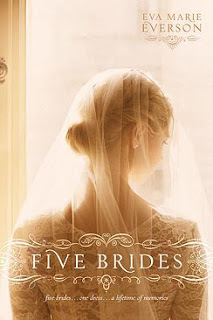 Eva Marie is a multiple award-winning author and speaker. She is one of the original five Orlando Word Weavers critique group members, an international and national group made up of critique chapters. She served as the original president from 2000 to 2007 and is now president of Word Weavers International, Inc. Eva Marie served as a mentor for Jerry B. Jenkins Christian Writers Guild for several years and has taught at a number of writers conferences nationwide. During the 2010-2011 school year, Eva Marie served as an adjunct professor at Taylor University in Upland, Indiana. She describes it as one of the best times she ever had while working. Eva Marie also serves as director of Florida Christian Writers Conference (along with Mark Hancock) and the Education Consultant for SON Studios.
Eva Marie is a multiple award-winning author and speaker. She is one of the original five Orlando Word Weavers critique group members, an international and national group made up of critique chapters. She served as the original president from 2000 to 2007 and is now president of Word Weavers International, Inc. Eva Marie served as a mentor for Jerry B. Jenkins Christian Writers Guild for several years and has taught at a number of writers conferences nationwide. During the 2010-2011 school year, Eva Marie served as an adjunct professor at Taylor University in Upland, Indiana. She describes it as one of the best times she ever had while working. Eva Marie also serves as director of Florida Christian Writers Conference (along with Mark Hancock) and the Education Consultant for SON Studios.She is both a past and current student at Andersonville Theological Seminarywhere she plans to receive her Masters in Old Testament Theologysometime before her ninetieth birthday. Eva Marie and her husband make their home in Central Florida where they are owned by one very spoiled dog, a funky chicken, and two hearts-full of grandchildren.
*Carol Award Winner for The Potluck Club ** ICRS Gold Medallion Finalist *** Multiple awards, including 2012 Inspirational Readers Choice Award & Maggie Award (Chasing Sunsets), 2013 Maggie Award & 2013 Christy finalist for Waiting for Sunrise, 2014 AWSA Golden Scroll Award (Slow Moon Rising), 2015 AWSA Golden Scroll Award (The Road to Testament)
****CBA Bestseller List several months running and a finalist for Retailers Choice Awards, 2013
Published on November 24, 2015 01:00



